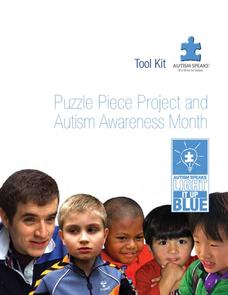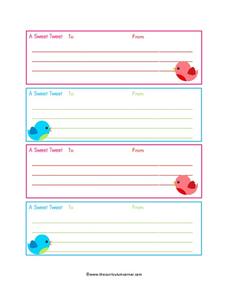Bully Free Systems
Bully Free Lesson Plans—Seventh Grade
Having a hard time defining bullying with your seventh graders? Discuss the different types of behavior one would see in a bullying situation with a series of lessons, worksheets, and group activities.
Do2Learn
Reciprocal Conversation
Keep the conversation going with a social skills activity. Designed for learners with autism, the lesson guides peers through the back-and-forth of a conversation, encouraging them to wait their turn before responding.
Do2Learn
Relationship Target
A graphic organizer focuses on relationship dynamics. Users fill in the various rings that indicate how close their relationships are.
Autism Speaks
Puzzle Piece Project and Autism Awareness Month
Looking for ways to include your class members in Autism Awareness Month? Use a packet that provides several opportunities to include the student body in an important campaign.
Curriculum Corner
Friendship Tweet
A tweet can only be 140 characters long, including spaces. Challenge class members to write a positive note to one or more of their peers in 140 characters or less. It is a great activity to give on Valentine's Day to upper...
Royal Conservatory of Music
The Anti-bullying Magazine
Get the word out about friendship, support, and a safe school community with a media literacy lesson about bullying. Young journalists investigate instances of bullying and take descriptive pictures as they compile a magazine to fight...
Pearson Longman
Emotions Reading
Explore the many types of feelings and how people express them with a lesson compiled of kid-friendly activities that spark critical thinking, self-reflection, and reinforce language and writing skills. Scholars delve into the variety of...
Curriculum Corner
Watch Me Grow!
Encourage creativity and reflection with a hands-on activity book. Scholars document their personal appearance, age, height, friends, and feelings about the first day of school to the last.
Cru High School
Games / Icebreakers
Twenty-three, fun-filled activities make up a list of icebreakers designed to familiarize class members with one another, and add a sense of community to the classroom.
Project B.A.S.I.C. Child Development Specialist and Child Care Consultation
Better Attitudes and Skills in Children
Little kids often have very big feelings, and need help expressing them. A set of social emotional lessons provide tangible ways for young elementary learners to visualize their emotions, focus on clear communication, and channel their...
Houghton Mifflin Harcourt
Special Friends: English Language Development Lessons (Theme 9)
Enhance language proficiency with a Special Friends themed English language development unit. Each lesson follows a listen, speak, move, and/or look routine that is guaranteed to get your scholars discussing topics such as animal...
Houghton Mifflin Harcourt
Family and Friends: English Language Development Lessons (Theme 4)
Family and Friends is the theme of a unit consisting of English language development lessons. Reinforce language proficiency, particularly in family vocabulary, basic needs, feelings, short vowel sounds, blending, reading high frequency...
Council for the Curriculum, Examinations and Assessment
Relationships and Sexuality
Adolescence is a tumultuous time for the learners in your class. Guide them through the rocky world of friendships, risks, personal health, and emotional turmoil with a set of lessons about teenager relationships and sexuality.
Council for the Curriculum, Examinations and Assessment
Health and the Whole Person
Health is more than measuring your blood pressure and eating nutritious foods. Eighth graders discuss the factors that play into an individual's health, including spirituality, social life and friendships, emotional stability, cognitive...
Utah Education Network (UEN)
Self-Concept: Self-Esteem
Most teenagers struggle with self-image and self-esteem. Guide them through these stormy waters with a series of activities focused on positive messages, true friendship and support, and self-concept.
Fox Valley Unitarian Universalist Congregation
Conflict Resolution
Many teenagers struggle with resolving conflicts with peers, friends, or family members. Here's a form that can guide them through the steps they need to take to identify the problem, their contribution to the problem, and their...
Museum of Disability
Taking Visual Impairment to School
What is the world like when you can't see, or when your vision is impaired? Learn about how Lisa communicates with the world around her with Taking Visual Impairment to School by Rita Whitman Steingold. Learners answer...
Museum of Disability
Rolling Along
Kindness and empathy can be as important as reading comprehension skills, especially for younger learners. Reinforce both with a lesson based on Rolling Along: The Story of Taylor and His Wheelchair by Jamee Riggio Heelan. As...
Museum of Disability
Looking Out for Sarah
Perry the dog is Sarah's best friend and her guide to the visual world. Young readers learn about guide dogs and communication with Looking Out for Sarah by Glenna Lang, through a series of discussion questions and activities.
Museum of Disability
Stand in My Shoes
Stand in My Shoes, a story by Bob Sornson, is an effective way to teach young learners about empathy and making friends. Once pupils read through the story, they answer a series of discussion questions and complete reading...
Museum of Disability
A Picture Book of Louis Braille
Teach kids about the beginnings of the Braille writing system with a lesson about Louis Braille. A series of discussion questions guide young readers though A Picture Book of Louis Braille by David A. Adler, and once they finish the...
Museum of Disability
Stand Tall, Molly Lou Melon
Help to create the next generation of friends with a lesson about accepting people who are different. As kids read Stand Tall, Molly Lou Melon, they answer a series of discussion questions and activities about making friends...
Museum of Disability
Taking Down Syndrome to School
Teach your class about the ways they can befriend and understand people who are different from them with a reading comprehension lesson. As youngsters read Taking Down Syndrome to School by Jenna Glatzer, they answer a...
Museum of Disability
Don't Laugh at Me
You can prevent bullying in your classroom by addressing kindness, empathy, and acceptance with your littlest learners early on. After reading Don't Laugh at Me by Steve Seskin and Allen Shamblin, kids discuss the ways that words...

























